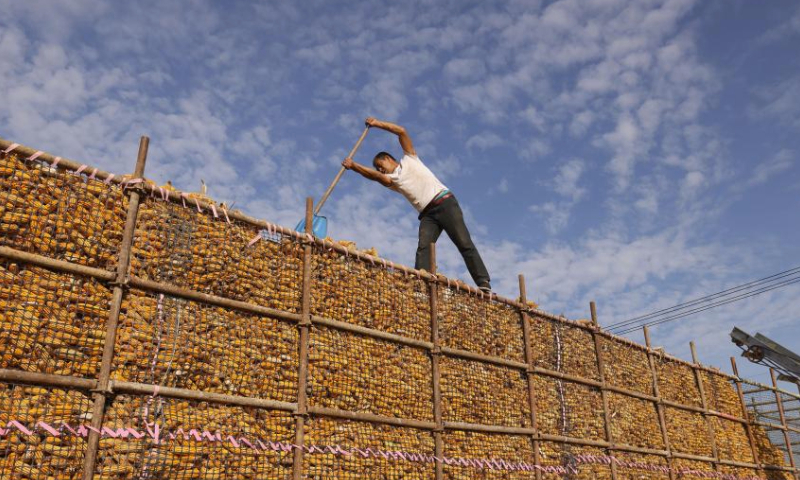Ministry vows to ensure a bumper farm harvest this year, contributing to food security

A farmer arranges harvested corns at Liunansu Village of Guangzong County in Xingtai City, north China's Hebei Province, Oct. 5, 2023. (Photo by Wang Lei/Xinhua)
China's Ministry of Agriculture and Rural Affairs (MOA) on Monday issued an implementation guideline on promoting comprehensive rural revitalization. Observers said that it is a key step in the follow-up of the No 1 Central Document for 2024 - the first policy statement the central government releases at the beginning of each year, which focuses on agricultural and rural issues.
In line with the priorities listed in the No.1 Central Document, the guideline emphasizes detailed measures related to food security, guarding against poverty, agricultural modernization and farmers' income growth, among other tasks.
It was also the first government policy paper on rural work after the eight-day Spring Festival holidays ended on Saturday.
The guideline urged local authorities to go all-out to ensure a bumper grain harvest, and they need to improve per unit yields to ensure that total grain output stays above 1.3 trillion jin (650 billion kilograms).
Localities should carry out responsibility evaluation work in farmland protection and grain security, and set production goals for grain, soybeans and oilseeds in their districts.
The total cultivated area needs to be stabilized above 1.77 billion mu (118 million hectares), while that of soybeans should be kept above 150 million mu, said the guideline, which also called for effective measures to stabilize the planted area of soybeans and expand oilseed planting.
The guideline urged local authorities to boost employment of rural residents lifted out of poverty, such as expanding outbound employment channels and promoting local employment and guarding against their return to poverty.
Li Guoxiang, a research fellow at the Rural Development Institute of the Chinese Academy of Social Sciences, told the Global Times on Monday that the implementation paper mapped out specific measures to ensure the content of the document be fully put into practice.
He added that the MOA is the major executing department for the document, which means the ministry will play an important role in coordinating the implementation of the No.1 Central Document for 2024.
Being the first guideline on rural work, which was immediately released after work resumed on Sunday after the Spring Festival, the paper mirrors the Chinese government's emphasis on guaranteeing food security and meeting the needs of farmers, observers said.
As China's overall grain output is growing steadily, local agricultural departments should focus on the rectification of their grain output structure, Li noted, while voicing strong confidence that annual grain production could exceed 1.3 trillion jin this year and even reach 1.4 trillion jin, as long as there are no major natural disasters.
Observers said an urgent task is to shore up the production of crops that are still in shortage, such as soybeans and corn. More agricultural technologies should be applied to produce high-yield varieties, they said.
"As the nation's grain output capacity and structure are constantly optimized, it will accommodate Chinese citizens' consumption upgrading and provide strong support for the overall economy," said Li.
Last year, total grain output reached a record high of 1.39 trillion jin, an increase of 1.3 percent over the previous year, MOA data showed. Grain output has hovered at more than 1.3 trillion jin for nine consecutive years.

